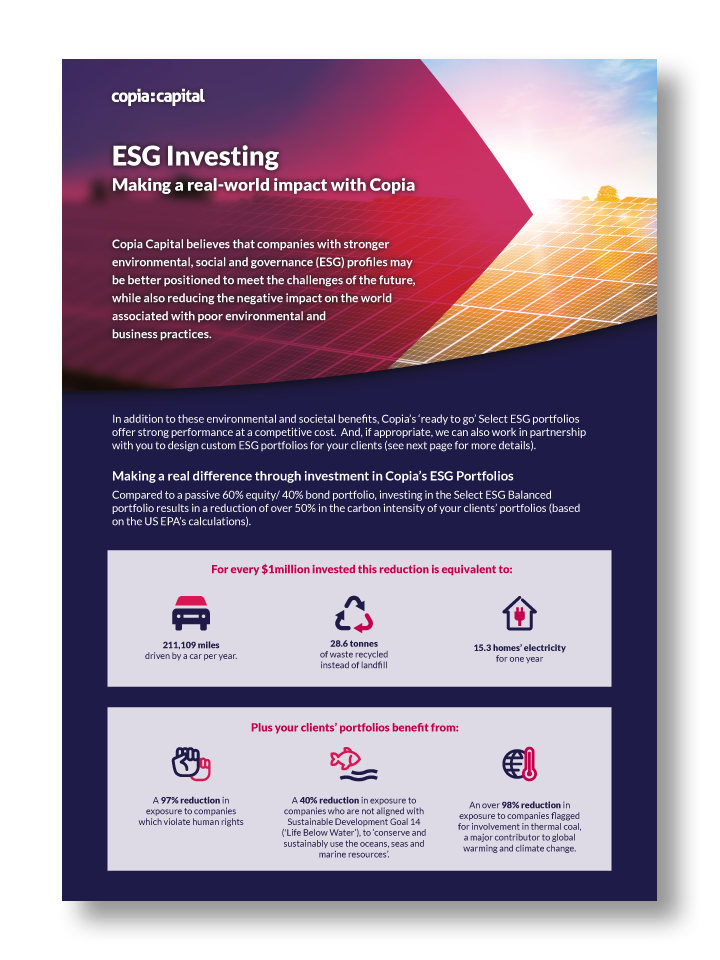In my previous blog post, I covered how advisers outsourcing portfolio management to a discretionary fund manager (DFM) has increased exponentially since the implementation of Consumer Duty in order to mitigate the increased compliance burden. I outlined how some advice firms are reluctant to pass full responsibility for client investments to a third party but highlighted the benefits of a custom MPS, which is designed in collaboration with the adviser and tailored specifically to the client.
Under the custom MPS model, the DFM is the manufacturer and the advice firm the co-manufacturer in Consumer Duty terms. Let’s take a moment to consider what is meant by these roles.
An FCA point of view
Since Consumer Duty, the FCA has set out how it views roles and responsibilities in relation to portfolio management:
- Manufacturers are firms that create, develop, design, issue, operate or underwrite a product or service. This includes advisers running model portfolios in-house and discretionary fund managers offering a tailored or custom solution, as well as fund managers and investment platforms.
- Distributors, on the other hand, are firms that offer, sell, recommend, advise on, propose or provide a product or service. From the perspective of investment services, if you’re recommending third-party off-the-shelf investment products and have no influence on investment construction, you’re the distributor. If your firm white labels the investment service, it must be clear who is actually providing the service to ensure the client doesn’t think you’re the manufacturer.
- Co-manufacturers are firms that determine or materially influence the design of a product or service that is manufactured by a third party. If you’re offering a tailored solution where you’re involved in the design of the investment, you will be classed as a co-manufacturer and the distributor of the investment services.
Looking at that, the co-manufacturer label can give rise to a new concern: by being involved in both manufacture and distribution, are you relinquishing control of the investments while staying on the hook for the risk you sought to alleviate through outsourcing?
This is an understandable reaction, but in practice, the clear division of responsibilities helps firms derisk their operations while also contributing to the robust value ecosystem we spoke about last time. Co-manufacturing agreements can offer the best of both worlds.
Best of both: what a good agreement looks like
Done well, co-manufacturing can help establish the foundations of the value ecosystem that custom portfolios deliver to clients.
As with most things, strong first principles are required. It’s a regulatory requirement to put in place an agreement from the outset. The agreement makes it clear to everyone involved – the DFM, the advice firm and their clients, the regulator and PI insurer – who is responsible for what.
In terms of what a good agreement looks like, the adviser is responsible for defining the target market, assessing suitability, reporting to the client and ensuring the client receives fair value. The DFM is responsible for designing the MPS model aligned to this target market, managing the portfolios, reporting to the advice firm and ensuring the service delivers fair value.
The task of identifying funds, assessing holdings in line with suitability and due diligence information, and managing portfolios accordingly, as well as communicating this activity to the adviser lies with the DFM. If questions arise, the adviser has the information at hand to review the DFM’s actions.
This leaves advisers freer to perform more granular fact finds and to spend more time with clients. This ensures that the DFM then has the precise information needed to tailor the portfolio in line with the target clients’ needs. Advisers also have more time to apply their expertise in financial and tax planning more effectively to add further value to clients.
With this clear and detailed information, the DFM can design sophisticated portfolios and manage them with more tailored direction than a standard off-the-shelf model. Under these conditions, the value and process are clearly documented, demonstrating the suitability and due diligence with greater clarity. All this combines to make it easier to evidence the target clients’ financial personality and involvement to the client themselves and the regulator.
Recalling ecosystems: is custom the future of managed portfolios?
When entered in good faith, a co-manufacturing agreement provides a solid foundation where value and compliance can be added and traced throughout each stage of the process.
Outsourcing through custom delivers transparency and value, providing an advantage over standard MPS models, and helping to minimise confusion regarding responsibilities and how information is accessed and presented.
Standard MPS models have become increasingly commoditised, and the compliance requirements surrounding them are growing more complex. The changing regulatory landscape is putting greater onus on advisers to shop around and evidence their investment due diligence processes. In our next blog, we’ll explore whether custom solutions are the natural evolution of managed portfolios, offering the operational ease of outsourcing, combined with the clarity and client-centric control of in-house investment management.
This article is intended for regulated financial advisers and investment professionals only. Copia does not provide financial advice. This information is not intended as financial advice and should not be interpreted as such.



